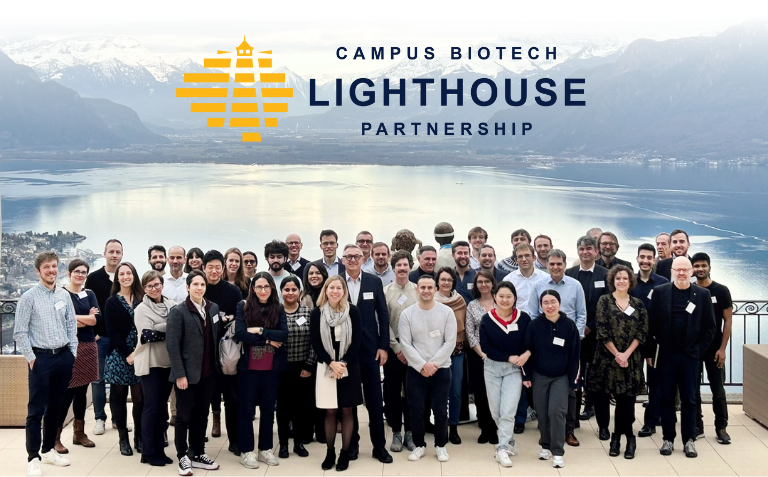
The Lighthouse Partnership: a Swiss cooperation to propel AI-Guided Neuromodulation
Share this article
This 4 years partnership is funded with CHF 18 Million from the Wyss Center, and involves EPFL Neuro X Institute, UNIGE Synapsy Centre for Neuroscience, and clinical partners at Campus Biotech.
The Wyss Center for Bio and Neuroengineering has joined forces with the EPFL Neuro X Institute, UNIGE Synapsy Centre for Neuroscience, and clinical partners at Campus Biotech in Geneva to unveil the Lighthouse Partnership. This strategic collaboration aims to revolutionize neurotechnology and artificial intelligence (AI)-guided neuromodulation to address the rising challenges of neurological and mental health disorders.
Global Health Challenge and Urgent Need for Innovation
The impact of neurological disorders on global public health is escalating, especially with the ageing population. Approximately 165 million Europeans are grappling with brain disorders, and the prevalence of neurological and mental disorders is expected to affect one in three people during their lifetimes. Recognizing this critical challenge, the Lighthouse Partnership endeavours to harness recent advances in AI, neuroscience, and neurotechnology to develop novel treatments.
A New Model of Inter-Institutional Cooperation
Tracy Laabs, Head of Special Programs & Development at the Wyss Center, emphasizes, “We are excited to launch the Lighthouse Partnership to drive the development of disruptive neurotechnologies. By combining AI and novel neuromodulation techniques, we aim to target deep brain structures non-invasively, advance a brain-spine interface for paralysis, and innovate peripheral nerve therapies.” This collaboration sets a new standard for cooperation, bringing together the Wyss Center, EPFL Neuro X Institute, UNIGE Synapsy Centre, and clinical partners for a holistic approach.
Interdisciplinary Collaboration for Cutting-Edge Therapies
The Lighthouse Partnership thrives on interdisciplinary collaboration, uniting over 30 leading scientists, engineers, researchers, and clinicians in neuroscience, engineering, computer science, and medicine. Stéphanie Lacour, Director of EPFL-Neuro X Institute, notes, “As a research institute exploring breakthrough neurotechnologies, we look forward to the translational capabilities of the Wyss Center to advance our most mature technologies into the clinic.”
Three Translational Projects
The partnership centres on three pioneering AI-guided neuromodulation translational projects:
- Non-invasive neuromodulation of subcortical structures: Leveraging AI for precision treatments of neuropsychiatric disorders.
- Brain-Spine digital bridge: Advancing technology to bridge the brain and spinal cord, overcoming paralysis.
- Minimally-invasive optogenetic therapy: Targeting peripheral nerve disorders in individuals living with spasticity.
Source: Wyss Center